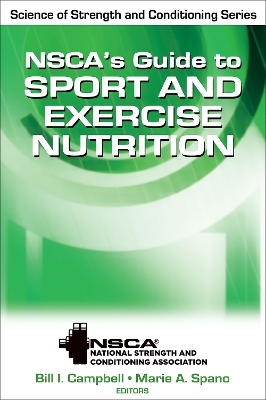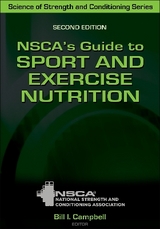
NSCA’s Guide to Sport and Exercise Nutrition
Human Kinetics (Verlag)
978-0-7360-8349-2 (ISBN)
- Titel erscheint in neuer Auflage
- Artikel merken
NSCA’s Guide to Sport and Exercise Nutrition provides valuable information and guidelines that address the nutrition needs for the broad range of clientele serviced by strength and conditioning professionals, personal trainers, and sport dietitians. Whether you work with fitness enthusiasts or competitive athletes, this resource will lead you through the key concepts of sport and exercise nutrition so that you can assess an individual’s nutrition status and—if it falls within your scope of practice—develop customized nutrition plans. Developed by the National Strength and Conditioning Association (NSCA) and subjected to an intensive peer-review process, this authoritative resource offers the latest research and literature review from respected scientists and practitioners with expertise in nutrition, exercise, and sport performance
NSCA’s Guide to Sport and Exercise Nutrition covers all aspects of food selection, digestion, metabolism, and hydration relevant to sport and exercise performance. This comprehensive resource will help you understand safe and effective ways to improve training and performance through natural nutrition-based ergogenic aids like supplementation and macronutrient intake manipulation. You will also learn guidelines about proper fluid intake to enhance performance and the most important criteria for effectively evaluating the quality of sport drinks and replacement beverages. Finally, cutting-edge findings on nutrient timing based on the type, intensity, and duration of activity will help you understand how to recommend the correct nutrients at the ideal time to achieve optimal performance results.
In addition to presenting research relating to sport and exercise nutrition, each chapter includes a professional application section that will help you make the connection between the literature and its practical implementation. Sidebars emphasize important topics, and reproducible forms consisting of a food log, brief athlete nutrition assessment, and goal-setting questionnaire can be copied and shared with your clients. A running glossary keeps key terms at your fingertips, and extensive references within the text offer starting points for your continued study and professional enrichment.
Each client and athlete requires a customized diet tailored to the frequency, intensity, duration, and specificity of the training and demands of the sport or activity. With NSCA’s Guide to Sport and Exercise Nutrition, you will learn how food, sport supplements, and their interactions with a client’s biological systems can enhance exercise and sport performance for optimal training, recovery, and competition.
NSCA’s Guide to Sport and Exercise Nutrition is part of the Science of Strength and Conditioning series. Developed with the expertise of the National Strength and Conditioning Association (NSCA), this series of texts provides the guidelines for converting scientific research into practical application. The series covers topics such as tests and assessments, program design, nutrition, and special populations.
Founded in 1978, the National Strength and Conditioning Association (NSCA) is an international nonprofit educational association that serves 33,000 members in 56 countries. Drawing on its vast network of members, the NSCA develops and presents the most advanced information regarding strength training and conditioning practices, injury prevention, and research findings. Unlike any other organization, the NSCA brings together a diverse group of professionals from the sport science, athletic, allied health, and fitness industries. By working to find practical applications for new research findings in the strength and conditioning field, the association fosters the development of strength training and conditioning as a discipline and as a profession. Bill I. Campbell, PhD, CSCS, FISSN, is assistant professor and director of the Exercise and Performance Nutrition Laboratory at the University of South Florida, an internationally recognized research laboratory dedicated to innovation in sport nutrition research. As a researcher and author, Campbell has published more than 100 articles and abstracts in scientific journals and over 45 articles for health and fitness magazines (print and electronic media). He was the lead author on the International Society of Sports Nutrition’s Position Stand: Protein and Exercise, which addresses some of the common questions and myths regarding protein intake and supplementation for athletes and physically active people Campbell is a member of the National Strength and Conditioning Association (NSCA), the American College of Sports Medicine (ACSM), and the International Society of Sports Nutrition (ISSN). Campbell is also a fellow of ISSN and serves on the organization’s advisory board. He received his PhD in exercise, nutrition, and preventive health from Baylor University in 2007. During this same year, he also received the Outstanding Doctoral Student Award for research and teaching. In 2009, Campbell received the Outstanding Undergraduate Teaching Award from the University of South Florida. Marie A. Spano, MS, RD/LD, FISSN, CSCS, CSSD, is one of the country’s leading sport nutritionists. She combines science with practical experience to help Olympic, professional, and recreational athletes implement customized nutrition plans to maximize athletic performance. Also a nutrition communications expert, Spano consults with leading food, beverage, and supplement companies regarding public relations and communications strategies. Spano enjoys the challenge of communicating scientific information in an approachable, understandable format to a variety of audiences. She has appeared on NBC, ABC, Fox, and CBS affiliates. She has also authored hundreds of magazine articles, trade publication articles, book chapters, e-zines, and marketing materials. A three-sport collegiate athlete, Spano earned her master’s degree in nutrition from the University of Georgia and her bachelor’s degree in exercise and sport science from the University of North Carolina at Greensboro (UNCG), where she also ran Division I cross country. Her experience as a college athlete gives her perspective on working with athletes of all levels, especially student-athletes. She has a firsthand understanding of how the demands of athletics, psychological aspects of injury, and sleep, recovery, and sound nutrition can affect an athlete’s overall well-being and performance Spano is a member of the National Strength and Conditioning Association (NSCA), the American Dietetic Association (ADA), the International Society of Sports Nutrition (ISSN), and Sports, Cardiovascular, and Wellness Nutrition (SCAN). She currently serves as vice president for the ISSN and is a member of the NSCA’s Nutrition Special Interest Group.
Chapter 1. Foods and Fluids for Training and Sport Performance
Bill Campbell, PhD, and Marie Spano, MS, RD
New Developments in Nutrition Research
Topics in Nutrition and Performance
Professional Applications
Summary Points
Chapter 2. Carbohydrate
Donovan Fogt, PhD
Types of Carbohydrate
Carbohydrate Regulation in the Body
Carbohydrate and Performance
Professional Applications
Summary Points
Chapter 3. Protein
Richard B. Kreider, PhD
Protein in the Body
Types of Protein
Protein and Performance
Professional Applications
Summary Points
Chapter 4. Fat
Lonnie Lowery, PhD, RD
Fat Digestion and Absorption
Types of Fat
Dietary Fat and Performance
Professional Applications
Summary Points
Chapter 5. Fluids
Bob Seebohar, MS, RD
Fluid Balance During Exercise
Measuring Hydration Status
Hydration and Performance
Age-Related Fluid Needs
Professional Applications
Summary Points
Chapter 6. Vitamins and Minerals
Henry C. Lukaski, PhD
Micronutrient Requirements for Athletes
Vitamins and Performance
Minerals and Performance
Professional Applications
Summary Points
Chapter 7. Strength and Power Supplements
Colin Wilborn, PhD, and Bill Campbell, PhD
Creatine
HMB
Protein and Amino Acids
Beta-Alanine
Professional Applications
Summary Points
Chapter 8. Aerobic Endurance Supplements
Bob Seebohar, MS, RD
Sport Drinks as Ergogenic Aids
Amino Acids and Protein for Aerobic Endurance Athletes
High Molecular Weight Carbohydrates
Caffeine
Sodium Bicarbonate and Citrate
Professional Applications
Summary Points
Chapter 9. Nutrient Timing
Chad Kerksick, PhD
Nutrient Timing and Aerobic Endurance Performance
Nutrient Intake and Recovery
Nutrient Timing, Resistance Training, and Strength and Power Performance
Professional Applications
Summary Points
Chapter 10. Energy Expenditure and Body Composition
Paul LaBounty, PhD, MPT, and Joey Antonio, PhD
Energy Balance
Hypocaloric Diets
Hypercaloric Diets
Sport Supplements to Improve Body Composition
Professional Applications
Summary Points
Chapter 11. Nutritional Needs Analysis
Marie Spano, MS, RD
Measuring Body Composition
Recording and Analyzing Food Intake
Professional Applications
Summary Points
Chapter 12. Consultation and Development of Athlete Plans
Amanda Carlson MS, RD
Providing Nutrition Knowledge
Maintaining Confidentiality
Developing the Athlete’s Nutrition Plan
Eating Disorders and Disordered Eating
Female Athlete Triad
Professional Applications
Summary Points
| Reihe/Serie | NSCA Science of Strength & Conditioning |
|---|---|
| Verlagsort | Champaign, IL |
| Sprache | englisch |
| Maße | 178 x 254 mm |
| Gewicht | 839 g |
| Themenwelt | Sachbuch/Ratgeber ► Gesundheit / Leben / Psychologie ► Ernährung / Diät / Fasten |
| Medizin / Pharmazie ► Gesundheitsfachberufe ► Diätassistenz / Ernährungsberatung | |
| ISBN-10 | 0-7360-8349-9 / 0736083499 |
| ISBN-13 | 978-0-7360-8349-2 / 9780736083492 |
| Zustand | Neuware |
| Haben Sie eine Frage zum Produkt? |
aus dem Bereich



